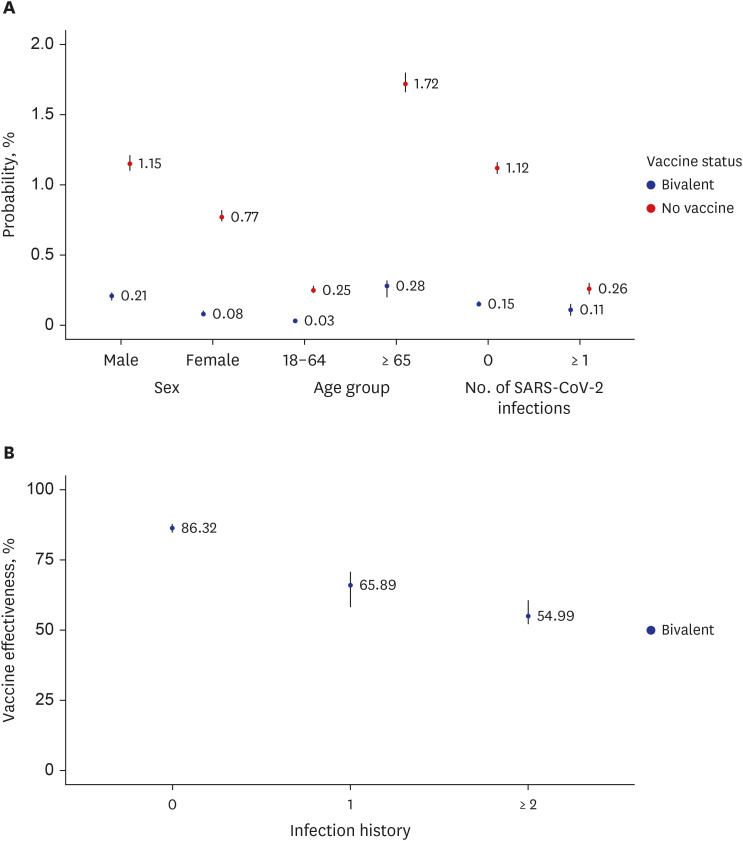J Korean Med Sci.
2024 Sep;39(37):e258. 10.3346/jkms.2024.39.e258.
Effectiveness of the Bivalent mRNA COVID-19 Vaccine for Preventing Critical Infection From the SARS-CoV-2 Omicron Variant in the Republic of Korea
- Affiliations
-
- 1Director for Epidemiological Investigation Analysis, Korea Disease Control and Prevention Agency, Cheongju, Korea
- 2Department of Preventive Medicine, College of Medicine, The Catholic University of Korea, Seoul, Korea
- 3Korea Insurance Development Institute, Seoul, Korea
- 4Department of Pediatrics, Korea University Anam Hospital, Korea University College of Medicine, Seoul, Korea
- 5Division of Infectious Diseases, Department of Internal Medicine, Korea University Ansan Hospital, Korea University College of Medicine, Seoul, Korea
- KMID: 2559780
- DOI: http://doi.org/10.3346/jkms.2024.39.e258
Abstract
- Background
This retrospective observational matched cohort study assessed the differences in critical infections caused by severe acute respiratory syndrome coronavirus 2 (SARSCoV-2) during the omicron-predominant period of the coronavirus disease 2019 (COVID-19) pandemic. We evaluated the vaccine effectiveness of bivalent mRNA vaccine compared to unvaccinated individuals.
Methods
We collected COVID-19 case data from the Korean COVID-19 vaccine effectiveness cohort. We calculated the probability of critical COVID-19 cases by comparing the vaccinated and unvaccinated groups.
Results
The risk of being critically infected due to SAR-CoV-2 infection was 5.96 times higher (95% confidence interval, 5.63–6.38) among older individuals who were unvaccinated compared to those who received the bivalent COVID-19 vaccine.
Conclusion
Our findings indicate that the bivalent vaccine reduces the disease burden of the SARS-CoV-2 omicron variant, particularly among the older population. Further studies are warranted to determine the effectiveness of booster doses of vaccines for SARS-CoV-2 infection.
Figure
Reference
-
1. Watson OJ, Barnsley G, Toor J, Hogan AB, Winskill P, Ghani AC. Global impact of the first year of COVID-19 vaccination: a mathematical modelling study. Lancet Infect Dis. 2022; 22(9):1293–1302. PMID: 35753318.2. Kim D, Ali ST, Kim S, Jo J, Lim JS, Lee S, et al. Estimation of serial interval and reproduction number to quantify the transmissibility of SARS-CoV-2 omicron variant in South Korea. Viruses. 2022; 14(3):533. PMID: 35336939.3. Ryu S, Han C, Kim D, Tsang TK, Cowling BJ, Lee S. Association between the relaxation of public health and social measures and transmission of the SARS-CoV-2 omicron variant in South Korea. JAMA Netw Open. 2022; 5(8):e2225665. PMID: 35960524.4. Winokur P, Gayed J, Fitz-Patrick D, Thomas SJ, Diya O, Lockhart S, et al. Bivalent omicron BA.1-adapted BNT162b2 booster in adults older than 55 years. N Engl J Med. 2023; 388(3):214–227. PMID: 36652353.5. Tseng HF, Ackerson BK, Sy LS, Tubert JE, Luo Y, Qiu S, et al. mRNA-1273 bivalent (original and omicron) COVID-19 vaccine effectiveness against COVID-19 outcomes in the United States. Nat Commun. 2023; 14(1):5851. PMID: 37730701.6. Tan CY, Chiew CJ, Pang D, Lee VJ, Ong B, Wang LF, et al. Effectiveness of bivalent mRNA vaccines against medically attended symptomatic SARS-CoV-2 infection and COVID-19-related hospital admission among SARS-CoV-2-naive and previously infected individuals: a retrospective cohort study. Lancet Infect Dis. 2023; 23(12):1343–1348. PMID: 37543042.7. Central Quarantine Countermeasures Headquarters. COVID-19 response guideline in South Korea. Updated 2023. Accessed March 14, 2024. https://www.ksid.or.kr/rang_board/list.html?num=5753&code=notice3 .8. Kim RK, Choe YJ, Jang EJ, Chae C, Hwang JH, Lee KH, et al. Comparative effectiveness of COVID-19 bivalent versus monovalent mRNA vaccines in the early stage of bivalent vaccination in Korea: October 2022 to January 2023. J Korean Med Sci. 2023; 38(46):e396. PMID: 38013649.9. Yi S, Choe YJ, Lim DS, Lee HR, Kim J, Kim YY, et al. Impact of national Covid-19 vaccination campaign, South Korea. Vaccine. 2022; 40(26):3670–3675. PMID: 35570077.10. Ryu S, Ali ST, Noh E, Kim D, Lau EH, Cowling BJ. Transmission dynamics and control of two epidemic waves of SARS-CoV-2 in South Korea. BMC Infect Dis. 2021; 21(1):485. PMID: 34039296.11. Orenstein WA, Bernier RH, Dondero TJ, Hinman AR, Marks JS, Bart KJ, et al. Field evaluation of vaccine efficacy. Bull World Health Organ. 1985; 63(6):1055–1068. PMID: 3879673.12. Why older adults can continue to benefit from covid-19 boosters. BMJ. 2023; 382:1662. PMID: 37491033.13. Petrone D, Mateo-Urdiales A, Sacco C, Riccardo F, Bella A, Ambrosio L, et al. Reduction of the risk of severe COVID-19 due to omicron compared to delta variant in Italy (November 2021 - February 2022). Int J Infect Dis. 2023; 129:135–141. PMID: 36708869.14. Choi HW, Achangwa C, Park J, Lee SM, Lee NY, Jeon CH, et al. Pediatric humoral immune responses and infection risk after severe acute respiratory syndrome coronavirus 2 (SARS-CoV-2) infection and two-dose vaccination during SARS-CoV-2 omicron BA.5 and BN.1 variants predominance in South Korea. Front Immunol. 2023; 14:1306604. PMID: 38193075.15. Ryu S, Cowling BJ. Human Influenza Epidemiology. Cold Spring Harb Perspect Med. 2021; 11(12):a038356. PMID: 32988982.
- Full Text Links
- Actions
-
Cited
- CITED
-
- Close
- Share
- Similar articles
-
- Comparative Effectiveness of COVID-19 Bivalent Versus Monovalent mRNA Vaccines in the Early Stage of Bivalent Vaccination in Korea: October 2022 to January 2023
- Low Neutralizing Activities to the Omicron Subvariants BN.1 and XBB.1.5 of Sera From the Individuals Vaccinated With a BA.4/5-Containing Bivalent mRNA Vaccine
- SARS-CoV-2 Omicron Variant of Concern: Everything You Wanted to Know about Omicron but Were Afraid to Ask
- Changes in SARS-CoV-2 antibody titers 6 months after the booster dose of BNT162b2 COVID-19 vaccine among health care workers
- SARS-CoV-2 Breakthrough Infection after mRNA-1273 Booster among CoronaVac-Vaccinated Healthcare Workers


